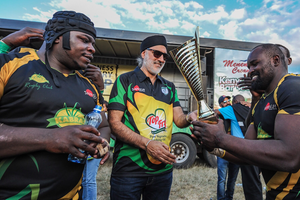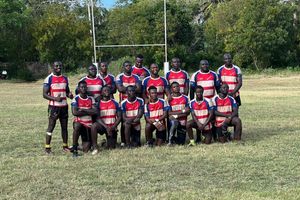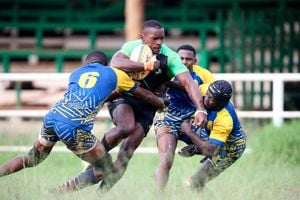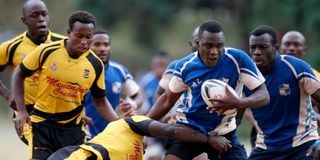
Mean Machine's Mike Oduor fends off Enos Musakali of Egerton University during Kenya Rugby Union Championship play-offs match at University of Nairobi grounds on February 6, 2021.
The University of Nairobi’s once all-conquering, popular rugby side, Mean Machine will be playing in the third-tier of Kenya’s rugby competition, the Nationwide League, next season.
What a spectacular fall for a team that lit up the local rugby scene with their flamboyant style of play full of running and flair that earned them three Kenya Cup titles.
In fact, Mean Machine are the only varsity side to have won Kenyan rugby’s most prestigious club title.
It was founded in 1977 when rugby in Kenya was predominantly played by white settlers and expatriates.
Some of the key players the team has produced is Kenya’s first professional player Edward Rombo, who played for the club from 1987 to 1990, winning the Kenya Cup with the side in 1989 and 1990.
Others are Tom Oketch and Cliff Mukulu, Bimbo Mutere, Chief Edebe and John “Speedy” Akatsa who were in the pioneering team that won the Kenya Cup in 1977.
The university’s grounds would fill to capacity during Kenya Cup matches involving Machine and their exuberant fans would create an electrifying atmosphere that made such fixtures a must-watch.
Mean Machine regularly contributed players to the various national teams, underlining the varsity side’s quality.
But so spectacular has been their fall that Kenya Rugby Union (KRU), University of Nairobi's top management and Mean Machine old boys have been compelled to step in and try to stem the slide.
The plan is to ensure the once feared Machine return to top flight rugby by 2027.
Machine, who won Kenya Cup in 1977, 1989 and 1990, were relegated from the KRU Championship in April after they finished last in the 11-team league.
The tumultuous 2023/2024 KRU Championship that was undoubtedly Machine’s worst season in history, saw them win a paltry two matches and lose 10.
They were initially relegated from Kenya Cup to the second tier KRU Championship in 2020 but returned to the Kenya Cup in 2022 only to drop back to the second tier league after one season.
A season later they have tumbled further down to the third division, Nationwide League .
How did such a team that was the dream destination of the best secondary school rugby players, reach such a low level?
University of Nairobi’s Director of Sports, Mbaabu Muriithu says that three years ago, the varsity academic calendar changed, a move that drastically affected Mean Machine’s training regime.
The varsity went on long recess from April to October meaning all the sports facilities remained closed and at a time when the rugby season was at its busiest period.
“Things were beyond the team’s control since they were unable to access facilities for training after the management declined to make them available,” said Mbaabu
Mbaabu notes that other top clubs took advantage to lure Machine players with scholarship offers that the University of Nairobi did not provide.
Mbaabu said the journey to rescue Machine, albeit late, has started with the formation of the old boy’s committee that has so far met with the top varsity management led by Vice Chancellor Prof Stephen Kiama.
Will this newly formed committee of old boys headed by KRU chairman Sasha Mutai rescue the club? The committee has Mbaabu, Leonida Kerubo, the Deputy Vice Chancellor, Academic Affairs, Mean Machine captain Victor Mwangi, and former captains Cliff Mukulu and Paul “Pablo” Murunga.
“There are no shortcuts and we must provide the basics like access to facilities when we are on recess,” said Mbaabu.
He said they are also going to review their scholarship system to lure the best players from high school to Machines.
It is telling that many University of Nairobi students play their rugby elsewhere.
They include Brian Mutua, Valerian Tendwa and Kevin Wekesa, who features for Kenya Cup champion Kabras Sugar, Richel Wangila, George Otieno and Samuel Simwata of Kenya Harlequin. Others are Bruce Odhiambo of Nondescript and Impala’s Onesmus Kinyanjui.
“Absolute Eschuma (Total Iron) must reclaim its glory. Our talent sourcing will happen across disciplines including hockey, basketball and football,” says Mbaabu. “We need to make the University of Nairobi both a centre for excellence in academics and sports.”
Mutai, who played as a flanker for Mean Machine from 1997 to 1999, says his committee is determined to return the team to Kenya Cup.
Mutai said that the first step is to have Machine feature in this year’s National Sevens Circuit before exploring ways to reintroduce scholarships.
“We need to work our ways of sourcing for sponsors since, the reality is that this is a public university that doesn’t get sports funding from the central government whose priority is academics, “said Mutai.
“We have close to 40,000 students and if we are to draw like 4,000 to matches then it will be a good bait to attract sponsors,” said Mutai.
Mean Machine coach Nick Abok said that the reason they gained promotion to Kenya Cup in 2022 was because they had a longer preseason preparation.
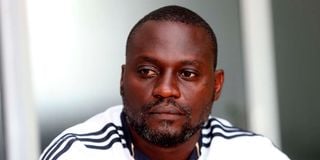
University of Nairobi's Mean Machine coach Nick Abok at Nation Centre, Nairobi on April 2, 2024.
“Players were committed to the team and we only lost three matches and went on to win the Championships and earn a ticket to Kenya Cup,” said Abok.
“But things changed when the academic calendar was changed thoroughly disrupting our training. When the university closed we talked to the management to open the hostels and facilities for us but they declined. We even missed playing in the sevens circuit and Impala Floodlits,” said Abok.
“We went into the Kenya Cup poorly prepared. We could play well in the first half but fade badly in the second half because of our poor physical state. Playing in the Kenya Cup and Championship is tough and without gym, diet specialist coaches, Machine can only achieve so much.”
Abok questions why other public universities like Kenyatta University and Masinde Muliro are getting support from their management including scholarships for players and not University of Nairobi.
“University of Nairobi is the grandfather of these universities having won the Kenya Cup way back in the 1970s. The only side that came close is Strathmore University who reached the final once,” said Abok, who wants the University League to be reintroduced so that clubs are compelled to release their players back to the varsity teams.
“It’s sad that we have no players in the national under-20 team yet Daystar, Strathmore, Masinde Muliro have,” said Abok.
Machine captain Victor Mwangi decried the deplorable state of rugby and other sports at the University of Nairobi.
“The management needs to focus on basic welfare like providing allowances and facilities. We are students and we will not consider playing for other clubs when such small provisions are in place for us,” said Mwangi.

